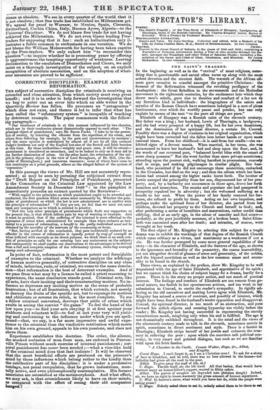CORRECTIVE DISCIPLINE: EXAMPLE AND REFORMATION.
THE subject of corrective discipline for criminals is receiving an extended and close attention, from which society must reap great benefit ; and it is in order to help forward the investigation that we beg to point out an error into which an able writer in the Quarterly Review has fallen. He presumes an "antagonism" which does not exist, and thence is led to infer that what has been called the "reformatory system" is incapable of teaching by deterrent example. The paper commences with the follow- ing paragraph- " Our treatment of criminals is at this moment influenced by two theories, which are in their tendencies almost diametrically opposed to each other. The principal object of punishment,' says Mr. Baron Parke, take to be the protec- tion of society, by deterring the offender from the repetition of his crime, and others from following his example, by the pain and inconvenience he sustains'; and the same opinion is maintained by almost all if not by all this eminent Jndge's brethren not only of the English but also of the Scotch and Irish benches at this time. By these authorities—weighty and grave ones, it will be owned— amendment is considered as secondary, and to be looked to only as it may aid in the further diminution of crime. On the other hand, the reformation of the cul- prit is the primary object in the view of Lord Brougham, of Mr. Hill, (the Re- corder of Birmingham) and numerous reasoners; some of whom have come to this conclusion on a priori grounds, others on the alleged failure of the system of 'repression.'" In this passage the views of Mr. Hill are not accurately repre- sented; as may be seen by perusing the subjoined extract from the "Draft Report on the Principles of Punishment, presented to the Committee on the Criminal Law appointed by the Law Amendment Society in December 1846 " : in the pamphlet it immediately precedes an extract quoted by the Reviewer— "With regard to the principles on which punishment ought to be awarded and conducted, the first question which arises must necessarily be, Whether the prin- ciples of punishment on which the law is now administered are in conflict with the principle of reformation? "If they are not, we feel that we need not enter upon any comparison as to which is entitled to priority. Now the only other principle of punishment which finds any supporters at the present day, is that which inflicts pain by way of warning or example. And it must be granted, that if the suffenng of the criminal is more effectual to the repression of crime when administered for example than when endured as inci- dental to a process of reformation, a benefit to the guilty individual must not be obtained by the sacrifice of the interests of the community at large. "But, having arrived at the conclusion, that pain incidentally endured by an offender in the course of reformation is equally potent by wayy, of example as when inflicted with example as its direct purpose, we think there is no such con- flict of principles as calls for our entering into any controversy on the subject; and consequently we shall confine our observations to the advantages to be derived from a full and complete adoption of the reformatory system, incluling example among such advantages."
In point of fact, reformation is the most potent and formidable of examples to the criminal. Whether we analyze the wilikings of human motives generally, of corrective discipline on any class of minds, infantine, rude, or criminal, we come to the same conclu- sion—that reformation is the best of deterrent examples. And if We pass from what may by a licence be called it priori reasoning to experience, the same conclusion stands good. Criminal acts, like all acts, have their inciting and their counteracting motives. No in,. fluence so depresses any inciting motive as the sense of probable frustration ; but of all frustration, that which extends, not merely to destroy the fruits of the specific act, but to expunge its motives and obliterate or reverse its relish, is the most complete. To see a fellow criminal converted, destroys that pride of crime which exults in seeing the convict "die game." To feel the hand of the law upon you—to find your acts obeying it at first against your stubborn and reluctant will—to feel at last your very will yield- ing and conforming to the influence under which you are spell- bound—that, we say, is a far more impressive and awful expe- rience to the criminal than the vindictive retribution which meets him on his own ground, appeals to his own passions, and rises not above them.
Experience establishes this doctrine. The order, the silence, the masked seclusion of man from man, are enforced in Penton- vile Prison without much exercise of internal punishment ; cor- poral punishment has never been needed ;—what a vice-like hold of the criminal mind does that fact indicate ! It will be observed that the most beneficial effects are produced on the prisoner's mind by those influences which belong rather to the kindly than the retributive part of his discipline: it is under a permissive tutelage, not penal compulsion, that he grows industrious, men- tally active, and even philosophically contemplative. His former associates are astonished at the metamorphosis. And what effect, we may ask, is that astonishment likely to have on their minds, as compared with the effect of seeing their old companion hanged ?


























 Previous page
Previous page